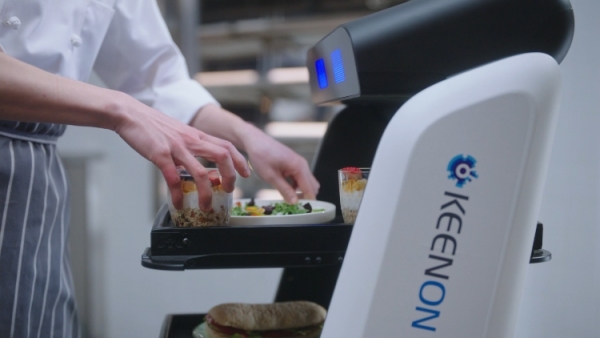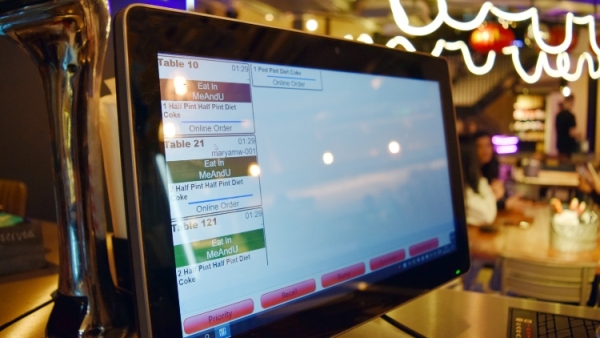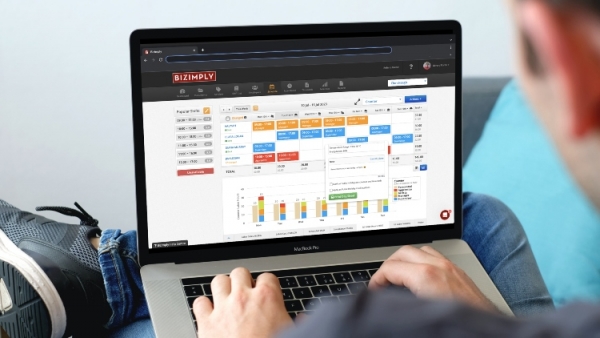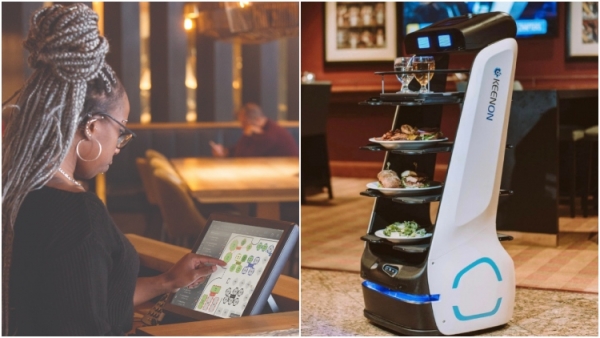FEATURE - Technology
FEATURE: How tech can free up time for your staff
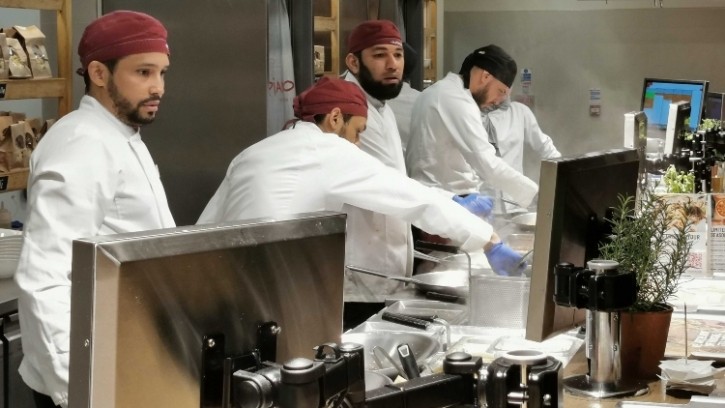
Wages account for around 30% to 33% of expenditure for operators in the industry, according to UKHospitality, but cutting costs by simply employing fewer people is likely to hurt your business in other ways.
However, there is a solution: a technological one (or a few technological solutions to be precise).
By using tech in a smart way to help with certain tasks, both front and back-of-house, you can reduce the number of personnel-hours needed and, in turn, reduce costs.
As Olivia Fitzgerald, chief sales and marketing officer at hospitality tech supplier Zonal, puts it: “In this climate of workforce shortages and soaring costs, operators need to make sure staff are using their time efficiently.
“Leveraging technology to automate time-consuming and laborious tasks will help to reduce repetitive jobs that were more traditionally completed by staff, freeing-up their time to focus on more important duties, such as providing great guest experiences.”
A good example of this is Zonal’s purchasing and stock control system, which allows staff to re-order popular products quickly, thereby improving accuracy, minimising the risk of over-ordering and cutting down administration time.
Zonal’s research shows 79% of consumers are satisfied with the ease and speed of digital payment, so having an online order-and-pay offering not only makes sense from a customer experience point of view, it can also help save staff time: using tech to enable customers to place their order, and receive and settle an accurate bill as soon as they’re ready to go, reduces the need for staff to spend time taking orders and payments.
What’s more, if your order-and-pay app is integrated into the main EPoS system, anything the customer inputs into the app will be updated in real-time for front-of-house and kitchen staff to see.
Single, integrated EPoS
In fact, having a single integrated EPoS system to manage your venue is fundamental, according to hospitality EPoS specialist Tabology.
Managing director Phil Neale says: “The benefits of having a single, integrated EPoS system to manage the venue maximises efficiency: there is only one system to learn and manage, from customer orders, right through to stock control and planning.
“In the current market, staffing is a challenge for pub operators both in terms of recruiting experienced staff, as well as the cost of employment. So it’s crucial that staff time is focused where it delivers the most benefits to the business, which is front-of-house-focused on customer service, rather than in the back office dealing with ordering and admin.”
With the Tabology Pub & Bar EPoS system, booking alerts come through directly to the EPoS screen, meaning this no longer needs to be a back-office job but can be managed by bar staff during service.
Also, with a mobile ordering option integrated with the EPoS, staff don’t have to duplicate work by keying orders from one system to another and all sales are tracked in one place.
While the cost of installing such a system can be high, the return on investment can be realised fairly swiftly, according to Neale.
As an example, the Tabology EPoS package costs around £1,250 for the hardware (two full EPoS terminals), plus £98 per month, but with average weekly time savings of four hours placing orders, two rota hours from improved scheduling, two hours of manual bookkeeping, and one hour per month on updating products, venues can achieve a ROI of just four months (based on 35 hours saved per month and pay of £10.42 per hour).
For larger food-led pubs and bar/restaurants, another techie solution to help save on staffing costs is to make a robot (or “cobot” as they've been dubbed due to their collaborative work alongside humans) your newest recruit.
While the notion of robots delivering dishes to tables might be an alien concept to many in the UK, in Japan it’s seen as quite the norm, and hospitality supplier SoftBank Robotics believes it’s only a matter of time before the concept catches on here.
Delivery robots
SoftBank’s tray delivery robots are equipped with a 3D camera and a lidar (light detection and ranging) system, similar to the kind of technology used in self-drive cars.
Their primary purpose is bussing – bringing dishes from the kitchen to the table and vice versa – with humans still on hand to actually serve the dishes to the customer.
With the robot taking care of the to-ing and fro-ing from the kitchen, the efficiency gains are significant. For example, at Las Iguanas’ London Stratford restaurant, the SoftBank tray delivery robot covered just over 30km in the first two weeks after installation.
SoftBank Robotics general manager Stefano Bensi says, contrary to taking human interaction away from restaurant service, the robots enable staff to be present in the dining area at all times, and thus able to respond immediately to customers’ needs.
He explains: “Because the waiter isn’t constantly going to and from the kitchen, stuff just happens: customers can order that extra bottle of wine, a side, a pudding, and suddenly you have the average price per sitting going up, and the table turnaround time going down, because when the customer is ready to ask for something it can happen straight away.”
While the initial cost of installing a robot is around £10,000 to £14,000 – depending on the model and whether it’s leased or purchased – the return on investment is typically between six and 12 months, according to SoftBank.
There’s certainly no shortage of options when it comes to tech solutions to aid every aspect of your business now, but to fully take advantage you need to ensure your EPoS provider offers integration with other services.
The Tevalis system integrates with a multitude of other platforms, including several leading mobile ordering platforms such as me&u, Mr Yum, Qikserve, FetchPAY and Sunday. Because these platforms empower customers to order their food and drink via their phone, without the need for staff intervention, it can reduce your staffing requirements while boosting overall revenue.
One of the most time-consuming yet crucial areas of running a pub is finance and accounting, and integrating your EPoS system with an innovative accounting platform provides both time-saving and financial benefits.
One of Tevalis’s key accounting partners, Lightyear, has found automating processes such as data entry and invoicing benefits 96% of users through reducing administration time and increasing transparency.
Controlling costs
Of course, managing your workforce efficiently is imperative when it comes to keeping control of staffing costs, and workforce and inventory management software such as that provided by Fourth simplifies the process.
Sebastien Sepierre, managing director EMEA at Fourth, says: “When it comes to workforce management, labour scheduling technology plays a pivotal role in enabling managers to not only work out who they need and when, but also deploy more insightful and efficient scheduling. This technology can calculate labour demand across every department and location within a business, ensuring that no shift is over or under-staffed and reducing labour costs as a result.”
Bizimply also offers workforce management technology, which automates staff rota creation and payroll, freeing up significant time for managers and supervisors so they can spend more time front of house, managing their teams and interacting with customers.
QSR Automations provides several time-saving tech solutions to help operators run their pub more efficiently, such as product projection and forecasting technology that reminds chefs what to cook, when to cook it, and how much to make of each item; advanced recipe training technology for new and existing chefs, which informs them, at a glance, of the recipes they should be using, allergen information and how to plate a dish; and table accuracy technology that provides teams with immediate visibility on the status of every table so they instantly know when a table needs to be cleared.
Take-up of some lesser-known areas of technology appears to be on the rise, likely as a result of the current staff shortages being faced by the sector.
Tech growth in hidden areas
Henry Seddon, managing director of Access Hospitality, explains: “There are, perhaps, less well-recognised areas of business where use of technology is growing in direct response to the need to release team members to perform other tasks while keeping costs down and ensuring standards and compliance are not affected.”
Among those growing areas of tech are digital checklists, such as Trail App from Access Hospitality, which removes paperwork and admin, prompting the right person to do the right task at the right time, and storing all records digitally so they’re readily accessible for compliance checks.
Another growing area is computer-aided facility management (CAFM) software, such as Access Maintain, which consolidates property maintenance and facilities management, enabling operators to reduce paperwork, manage costs and make speedy fixes.
As well as providing an automatic process to manage annual servicing, regulatory and compliance obligations, Access Maintain handles contractor management through pre-screening and approval of the best contractors for each job, and streamlines the invoice process, with authorisation and control possible by one click on a mobile device.
The technology can help reduce the business impact of broken equipment, such as cellar cooling equipment, by making it easier to report issues and ensuring contractors can react quickly to requests.
Access’s Seddon concludes: “For hospitality businesses that want to deploy more staff in customer-facing roles, a tech solution such as Access Maintain offers an outsourced property maintenance service with full management that unlocks access to expert knowledge and experience.
“With regular reporting and benchmarking, the service has a full audit trail and reduces the need to employ a full-time specialist team in-house, so that resource can be directed more effectively on delivering a great guest experience.”
New law to give better deal on card payment charges
Pubs and bars have been enduring excessive card payment charges for years but new legislation has come into force that should make it easier to get a better deal.
Following a four-year review, in July, a series of changes were introduced to the SMB payments market in a bid to demystify card payment services and improve optionality for independent businesses.
The new regulations mean payment providers need to be more transparent with their customers and remind businesses when their contracts are due to expire. There are also now clearer standards on the transparency required of the UK financial sector, with service providers expected to ensure they are selling products and services that are fit for purpose and offer clear value.
However, a recent survey by Statement, a price comparison platform set up specifically to help SMBs with switching card payment providers, revealed 50% of pub respondents were not aware about the regulatory amendment that makes switching card payment provider easier.
The survey also found 43% of merchants in the food and beverage sector struggle to comprehend the charges from their payment providers; half of bars and clubs, and 57% of merchants in the food and beverage industry, believe their current payment provider's fees are too high; 30% of pub respondents were unaware of the annual amount their payment provider deducted from their earnings; and 60% of bars and clubs were unaware that by switching their payment provider, they could potentially save thousands of pounds.
Ed Hardy, founder and chief executive officer at Statement, says: “Accepting card payments had been a frustrating, but essential, element of owning a business for far too long, predominantly due to the opaque nature of entering into a contract in the first place.
“In fact, 90% of contracts are still signed through telesales or field sales, making it hard to quickly search the market, and leading merchants into making the wrong choice for their business due to pushy sales tactics and confusing lingo.
“The combination of price opacity between firms and high frictional costs of switching, meant many SMB merchants were paying two to three times the market rate for their payments.”
After informing pub operators about the recent regulatory changes, 70% of pubs in Statement’s survey expressed interest in making a switch within the year, and Statement’s platform takes the stress out of switching: operators simply need to upload their most recent merchant statement, and the online tool will automatically pull the required information to provide a tailored recommendation of payment providers, plus clear instructions on how to make the switch.
